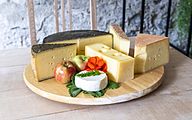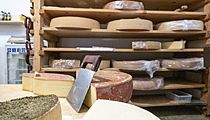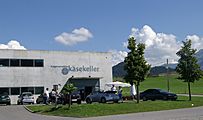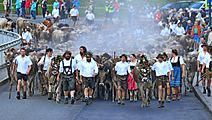KäseStrasse Bregenzerwald facts for kids
|
KäseStrasse Bregenzerwald
|
|
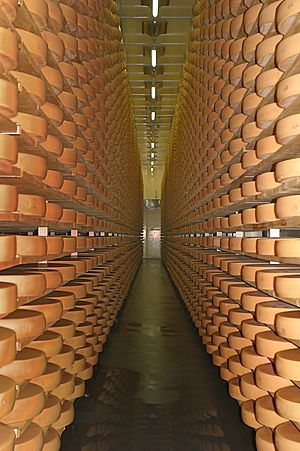
Cheese cellar in Lingenau along the cheese route in the Bregenz Forest
|
|
| Formation | 1998 |
|---|---|
| Founded at | Bregenz Forest, Vorarlberg |
| Type | Nonprofit |
| Purpose | Supporting the traditional local agricultural landscape of the Bregenz Forest |
| Location | |
| Services | Culinary tastings, outdoor activities related to the cultural and natural landscape of the Bregenz Forest |
| Leader | Max Bereuter (2021) |
| Website | https://www.kaesestrasse.at/en/ |
The KäseStrasse Bregenzerwald (which means "Cheese Route of the Bregenz Forest") is a special path in Austria. It connects many businesses that make delicious cheese in the Bregenz Forest area.
This group started in 1998. Its main goal is to help local farmers and craftspeople. Everyone involved works to keep the traditional farming ways alive in the Bregenz Forest.
Contents
History of Cheese Making
The Bregenz Forest has a very old tradition of making cheese. Long ago, the Celts first brought farm animals and mountain farming to this area. For hundreds of years, milk and cheese were super important for the people living here. Especially the "mountain cheeses" (called Bergkäse) made in the high pastures and village dairies.
Soon, cheese became a big product to sell to other places. This helped the local economy grow a lot.
Moving Animals for Milk
To get milk for cheese, local farmers used to move their animals several times a year. In winter, animals stayed in the valleys. In spring, they moved to medium-high pastures. In summer, they went to the highest mountain pastures. This way of farming is called alpine transhumance.
The milk from cows, goats, and sheep was collected. It was then sent down the mountain using special cables, carts, or cars. The milk went to a cheese factory, often near Hittisau, where it was turned into cheese.
Keeping Traditions Alive
When Austria joined the European Union in 1995, the Bregenz Forest got money to help its rural economy. Without the KäseStrasse Bregenzerwald, many small farms might not have survived in the 1990s.
The alpine transhumance farming style has shaped the beautiful landscape of the Alps. It is still practiced today. In 2011, UNESCO recognized this farming method in the Bregenz Forest as an important intangible cultural heritage. This means it's a valuable tradition that should be protected.
UNESCO noted that the Bregenz Forest is a stunning place that has kept its traditional farming ways. Many old farmhouses from the 1700s and 1800s are still standing. These farms, huts, and pastures are a key part of the scenery in Vorarlberg. This special farming also led to unique Alpine culture, like Yodel and Alphorn music.
The Cheese Route
The Cheese Route begins in Bregenz. It follows the Bregenzerwaldstraße L 200 road, connecting villages through the Alps. Along this route, you can find many farmers, dairies, shops, and cheese makers.
In 2005, the local cheeses, like "Bregenzerwälder Alpkäse" (Bregenz Forest alp-cheese) and "Bergkäse" (mountain-cheese), became part of the "Genussregion Österreich" project. This group promotes traditional Austrian food and products.
Photo gallery
-
Cheese shop in Schwarzenberg
-
Bregenz Forest cheese cellar (Bregenzerwälder Käsekeller) in Lingenau
-
The longest cheese-table in the world (in the Guinness book of records) was set up on May 31st, 2008. It was about 500 meters long! This was a celebration for the 10th anniversary of the KäseStrasse Bregenzerwald in Andelsbuch, serving about 2000 guests.
See also
 In Spanish: Ruta del Queso Bregenzerwald para niños
In Spanish: Ruta del Queso Bregenzerwald para niños
 | Calvin Brent |
 | Walter T. Bailey |
 | Martha Cassell Thompson |
 | Alberta Jeannette Cassell |


